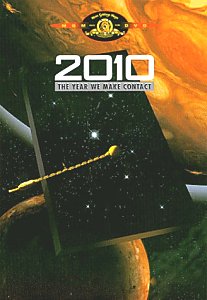
2010
US, 1984, 111 minutes, Colour.
Roy Scheider, Helen Mirren, John Lithgow, Bob Balaban, Keir Dullea, voice of Douglas Rain.
Directed by Peter Hyams.
2010 is an entertaining science fiction, science fantasy film. Many will enjoy it. Many would prefer that it had never been made. In 1968, Stanley Kubrick's 2001: A Space Odyssey made strong impact and has since become a classic. It was shaped by Kubrick's visual flair and was based on Arthur Clarke's science-fiction insights. This time Peter Hyams (Capricorn One, Outland) works efficiently as director of photography, writer, producer and director. The film is generally much more straightforward than 2001, which means that the air of mystery and mysticism does not seem quite so poetic (or even so credible) as with 2001.
A number of the technicians worked on this sequel and show great flair. However, the material is familiar, there have been many science-fiction, large budget films since 1968 as well as the Star Wars explosion. To that extent, 2010 at times seems merely a variation on Star Trek.
Roy Scheider is suitably anguished as the American hero. Helen Mirren is quite effective as the Russian leader. Clarke's vision is of a world at war (echoing '80s concerns about upheavals in central America) but hopes that the gift of science and the monolith is a world of peace and harmony. The quotation from 2001, 'It's full of stars' is the key to responding to this film. Keir Dullea, the hero of 2001, speaks this insight and reappears (briefly recapitulating his stages of change at the end of 2001).
While 2001 is timeless, 2010, with its considerable merits, nevertheless seems an optimistic (over?optimistic?) film for the '80s.
1. The film in itself as entertaining science-fiction, science? fantasy? Its parable for the '80s? Its vision of the future? Optimism? It's full of stars!
2. The impact of 2001, the work of Arthur Clarke and his vision? His continued interest in the themes? This film offering explanations of 2001? Satisfying?
3. The transition from Stanley Kubrick to Peter Hyams as director? Hyams' contribution: visual, thematic, style, dialogue, direction? His achievement? The re-creation of space, space ships, special effects? The Earth of the future? Spacecraft and travel? The re-creation of Hal? The monolith and its vision? The musical score (and the taking up again of Richard Strauss' 'Thus spake Zarathustra')?
4. The continuity between films, the initial computer report, the recapitulation of the experience of 2001, the opening up of the mystery?
5. Heywood Floyd and his work? His responsibility for the previous mission? The landscape with the dishes? The visit of the Russian? Their discussion, fencing verbally, argument? American and Russian rivalries? The new mission, the situation of war, nuclear tension? The possibility of collaboration between Russia and the United States, good reasons and bad? Central America and the alerts? The collaboration and the impact for the public? The selecting of the team? Their styles? The vision of working together, harmony? The declaration of war and its meaninglessness out in space? Decisions to be made, the final vision of harmony and peace?
6. Floyd and his link with the expedition of 2001? His years after the expedition? His wife, son, their home? His decision to be away? The sacrifice? His going on the mission, sleeping, his being wakened, the Russian team, his participation in the travel? Getting the data about the Jupiter expedition? The other experts and their being woken, being filled in?
7. The situation in space? The importance of the voyage? The The relationships between Russians and Americans? The puzzle about the previous expedition?
8. The film's attention to detail of life aboard the Leonov? The discovery, its mission, the puzzle, its getting closer to Jupiter? The new data coming in?
9. Tanya and her leadership of the expedition? The Russian technologists, the landing, the disintegration? Walter Curnow and his fear of heights, going on his mission, walking in space? Dr. Chandra and his going to reactivate Hal? The mystery of Hal, the programming of lies, the discovery of the political deceptions? The mystery of Hal's coping and dealing with the programming of lies? The monolith in space, its presence, its increasing size? The message about peace, the explosion, the two suns, the monolith finally in the primeval swamps of the lifeless moon? A sign of optimism? The previous mystical elements about the monolith? Signals of the transcendent, of God?
10. Floyd and his experiences, relationships, testing Dr. Chandra? His vision of Dave Bowman? Seeing him in his various stages? The message of hope, something wonderful about to happen. the stars? Curnow and his participation, his fears, competence? Chandra and his introducing himself to Hal. the friendship between the two? The discovery of the information? His having to leave Hal? The split?second timing of his return?
11. The Russians, Tanya, her command of the ship, decisions, sharing family memories with Floyd? Dave Bowman and his return, his wife seeing him on television, her remarrying. her response to him? His vision with Floyd? The range of his stages of development and change? The star child and the sign of the future? The film as a Star Trek story, a space mission? The film as a comment on cold war. possibilities of peace? The optimistic message and its welcome?